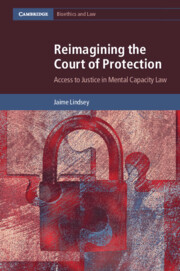Book contents
- Reimagining the Court of Protection
- Cambridge Bioethics and Law
- Reimagining the Court of Protection
- Copyright page
- Dedication
- Contents
- Figures
- Tables
- Acknowledgements
- Table of Statutes
- Table of Cases
- 1 Introduction
- 2 Procedural Justice
- 3 Participation and Voice
- 4 Mediating Disputes
- 5 Expert and Experiential Evidence
- 6 The Courtroom Space and Design
- 7 Conclusions
- References
- Index
- Books in the Series
5 - Expert and Experiential Evidence
Published online by Cambridge University Press: 17 September 2022
- Reimagining the Court of Protection
- Cambridge Bioethics and Law
- Reimagining the Court of Protection
- Copyright page
- Dedication
- Contents
- Figures
- Tables
- Acknowledgements
- Table of Statutes
- Table of Cases
- 1 Introduction
- 2 Procedural Justice
- 3 Participation and Voice
- 4 Mediating Disputes
- 5 Expert and Experiential Evidence
- 6 The Courtroom Space and Design
- 7 Conclusions
- References
- Index
- Books in the Series
Summary
Chapter 5 explores the use of expert and experiential evidence in the CoP, particularly analysing the contribution of the evidence given by the Person, linking with the arguments set out in Chapters 3 and 4. Analysing the empirical data, the chapter argues that the current hierarchy of evidence in the CoP undermines access to justice for the Person at the centre of proceedings and that changes are required to rebalance the evidential practices to achieve a more just process. The chapter starts with an overview of the use of evidence in proceedings, before turning to the hierarchies of knowledge, exploring the underpinning evidential justifications for both expert and experiential knowledge claims and the differing value attributed to each. Following analysis of the hierarchy of evidence, it is explained how this impacts upon access to justice and how this shows that the CoP has failed to secure procedural justice in this regard. The final section includes some examples of possible reforms to CoP evidential practices to address the procedural justice problem identified.
Keywords
- Type
- Chapter
- Information
- Reimagining the Court of ProtectionAccess to Justice in Mental Capacity Law, pp. 148 - 188Publisher: Cambridge University PressPrint publication year: 2022



